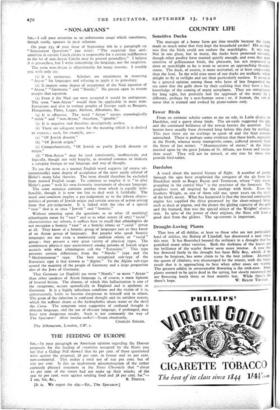" NON-ARYANS "
Sist,—I call your attention to an unfortunate usage which sometimes, though rarely, appears in your columns.
On page 235 of your issue of September 6th in a paragraph on " Internment Questions " you write: " The suspicion that anti- semitism in certain Czech circles is responsible for a certain indifference to the lot of non-Aryan Czechs may be proved groundless." I believe it is groundless, but I write concerning the language, not the suspicion.
The term non-Aryan is objectionable for many reasons. I trouble you with only six : (i) It is erroneous. Scholars are unanimous in reserving " Aryan " for languages and refusing to apply it to genealogy.
(2) It implies some degree of acceptance of the Nazi equation of " Aryan," " Germanic " and " Nordic." No person open to reason accepts that equation.
(3) Even if the Nazi use were accepted it would be ambiguous. The term " non-Aryan " would then be applicable to most non- Europeans and also to various peoples of Europe such as Basques, Hungarians, Finns, Lapps, Maltese, Albanians, &c.
GO It is offensive. The word " Aryan " means etymologically " noble " and " non-Aryan," therefore, " ignoble."
(5) It is negative and therefore descriptively useless.
(6) There are adequate terms for the meaning which it is desired to express ; such, for example, are—
(a) " Of Jewish descent."
(b) " Of Jewish origin."
(c) Comprehensively, " Of Jewish or partly Jewish descent or origin."
(d) "Non-Aryan " may be used consistently, inoffensively and logically, though not very happily, in inverted commas to indicate a category foreign to our language and way of thought.
To use the term as a normal English word suggests (of course un- intentionally) some degree of acceptance of the most easily refuted of Hitler's many false theories. The term should therefore be excluded from normal English usage. To continue to employ it is " to play Hitler's game " with his own favourite instrument of obscure language.
The same sentence contains another term which is equally inde- fensible, though it is now too late to deal with it faithfully. The word anti-semitism implies a pre-judgement as to the inborn charac- teristics of persons of Jewish origin and certain courses of action arising from that pre-judgement. It is linked with the idea of a special "race " that is at once " Jewish " and " Semitic."
Without entering upon the questions as to what (if anything) ethnologists mean by "race " and as to what extent (if any) " racial " characteristics are inborn, it suffices here to recall that ethnologists do not recognise a Semitic " race " or a Semitic ethnic or " tacial " group at all. They know of a Semitic group of languages just as they know of an Aryan group of languages. But peoples who speak Semitic languages are not even a moderately uniform ethnic or " racial " group ; they present a very great variety of physical types. The commonest physical type encountered among persons of Jewish origin accords with what ethnologists call the " Eurasiatic." This type presents certain differences from the " Nordic " type and the " Mediterranean " type. The best recognised sub-type of the Eurasiatic type is that known as " Alpine." To the Alpine sub-type accord the majority of the people of Germany and a large proportion also of the Jews of Germany.
That Germans (or English) are more " Nordic " or more " Aryan " than other speakers of Aryan language is, of course, a mere figment of fevered brains. The disease, of which this hallucination is one of the symptoms, occurs sporadically in England and is epidemic in Germany. It is a highly infectious condition and the victim of it is, unfortunately, liable to become dangerous to himself and to others. The germ of the infection is confused thought and its antidote reason, which the sufferer shuns as the hydrophobic shuns water or the devil the Cross. The symptom most suggestive of confused thought is obscure language, and the use of obscure language, if prolonged, may have very dangerous results. Such is not commonly the way of The Spectator! Absit invidia verbo! —Yours obediently,


























 Previous page
Previous page